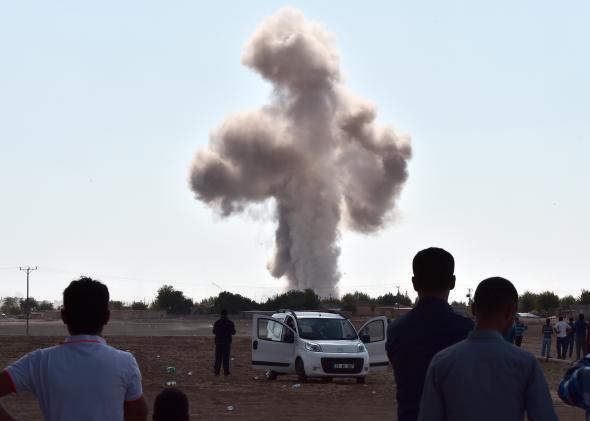The latest focal point of the Syrian civil war is Kobani, a small city near the Turkish border where ISIS militants have been battling Kurdish forces since mid-September. ISIS flags are reportedly now flying over parts of the city, which has been under control of local Kurdish forces since 2012. U.S. airstrikes don’t appear to have done much to stop the Islamic State’s advance, and U.S. officials now say the city is on the verge of falling.
This is important for geographical, humanitarian, and political reasons. If Kobani falls, it will give ISIS control of a wide swath of the Syria-Turkey border, putting it one step closer to establishing the “state” implied in its name. Taking Kobani would also establish a corridor linking the group’s de facto capital in the eastern city of Raqqa with Aleppo in the west. Aleppo, Syria’s largest city, is also probably its most important battlefield. It’s the opposition rebels’ last major urban stronghold, but they’ve been besieged for months by both Syrian government forces and ISIS. If it falls, it will be both a humanitarian catastrophe for the city’s 2 million people and a devastating blow to the non-ISIS rebels.
Since coming under Kurdish control, Kobani has been a relatively stable haven for civilians fleeing the fighting in other parts of Syria. But the assault has reportedly forced as many as 160,000 people to abandon their onetime refuge. More will follow if the city falls in the coming days.
Beyond the refugee situation, the Kobani crisis is also of major political significance to Turkey, which has been one of the main backers of anti-Assad forces since the beginning but has been extremely reluctant to get involved in the fight against ISIS, much to the irritation of its NATO allies.
The Kobani crisis has sparked protests in at least six Turkish cities by Kurds, who accuse Turkey of not doing enough to stop ISIS. More than a dozen people have been killed in clashes with police, who have used water cannons and tear gas on the protesters. As the Independent puts it, “The likely fall of Kobani may mark an irrevocable breach between Turks and Kurds in Turkey, Syria and Iraq.”
This isn’t good news for the future of the anti-ISIS coalition. So far, ISIS’s main obstacle has been that nearly every major actor in the Middle East, from Israel to al-Qaida, is against it. Its main advantage has been that many of these actors don’t get along with each other. Further tensions between Turkey and the Kurds won’t help matters.
A major ISIS bulwark on its borders may finally spur Turkey to take direct military action within Syria. But given President Recep Tayyip Erdogan’s frustrations with Western countries’ reluctance to target Bashar al-Assad, it’s not clear how much Turkey would work in tandem with other countries. Turkey has been calling for airstrikes against Assad’s forces and the establishment of a no-fly zone in northern Syria, two goals Washington has dismissed, so it’s possible we could end up with yet another military actor with its own agenda operating on the ground in Syria.
The fall of Kobani would also be seen as a sign of the inability of U.S. airstrikes to stop ISIS’s advance. Though it’s not entirely clear that this is actually a major U.S. priority. Airstrikes around Kobani have apparently been fairly sparing, to the alarm of Kurdish forces defending the city, and U.S. officials have said they don’t consider it a major concern. The Obama administration’s near-term priority, as some anonymous officials explained to CNN, is not protecting Syrian cities but damaging ISIS’s command posts and infrastructure enough that it can be rolled back from Iraq. (There are some signs that airstrikes are stopping ISIS’s advance in some instances on the Iraqi side of the border.) After some semblance of stability is returned to Iraq, the thinking goes, the U.S. will turn its attention to Syria, hopefully with some well-equipped and reliable local allies in place by then.
It’s difficult to imagine that Iraq could be stabilized while its neighbor continues to disintegrate, but that seems to be the prevailing idea right now.
